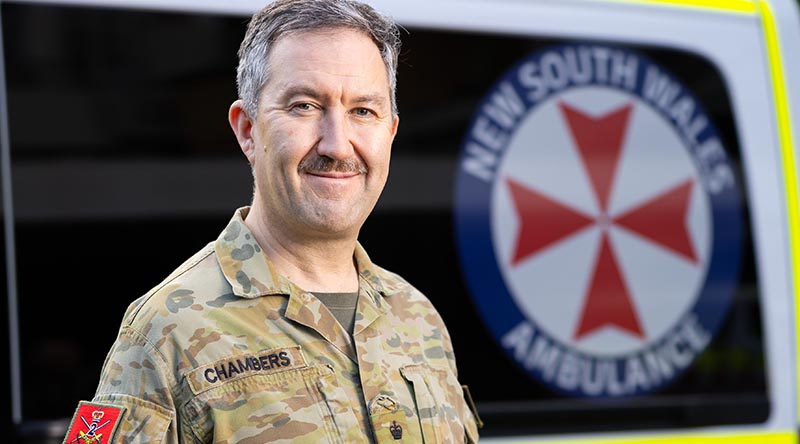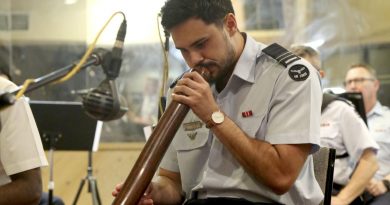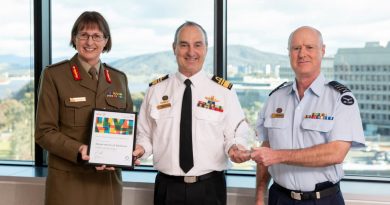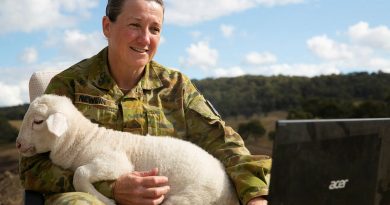Bondi-stabbing victims saved by dual-life surgeon
Share the post "Bondi-stabbing victims saved by dual-life surgeon"

Anthony Chambers had just finished removing a patient’s appendix at St Vincent’s hospital when every phone in the operating room rang and the trauma alert went off – four critically injured patients were inbound from a multiple-stabbing incident at Bondi.
CAPTION: Australian Army Colonel Anthony Chambers from 2nd Health Brigade, at St Vincent’s Hospital Sydney, NSW. Story by WO2 Max Bree. Photo by Corporal Johnny Huang.
In his civilian capacity, Dr Chambers is a cancer surgeon specialising in removing breast and thyroid tumours, and melanoma, but, in another guise, Colonel Chambers is posted to 2nd Health Brigade as an Army Reserve medical officer with 28 years’ service.
On that fateful Saturday, 13 April 2024, he was the St Vincent’s trauma surgeon on duty – a role that usually involves treating blunt trauma from vehicle accidents, falls and assaults – but stab wounds are less common.
By the time Dr Chambers reached the ED, the first patient arrived and more victims soon followed, all needing resuscitation, having lost a significant amount of blood.
“A sharp implement that’s long enough is going to cause deep laceration through tissue, that can cause serious bleeding and organ damage,” Dr Chambers said.
“If it happens to pass through something like the gastrointestinal system, that will leak an organ’s contents and lead to serious infection.”
As the team worked to stop haemorrhaging and secure airways, Dr Chambers weighed up which patients would go first to the CT scanner and which would go straight to surgery.
“If their bleeding is life-threatening, going to the scanner will just delay them having an operation to stop the bleeding.
“They’re better served going straight to the operating room,” he said.
While treating external bleeding often involves simple direct pressure, Dr Chambers said stopping internal haemorrhaging meant surgeons getting inside the chest or abdominal cavity.
Once it’s located, gauze packing may be used, blood vessels stitched or tied closed, or staples applied across tissue to stop bleeding.
If the patient continues to lose blood, the anaesthetist’s team conducts a ‘massive transfusion protocol’ of blood, clotting factors and platelets.
“We’re attacking it from two ways and it’s a race to stay on top of the bleeding,” Dr Chambers said.
“If we start losing that race, the patient’s blood pressure drops, they can’t get enough oxygen to their brain, heart and kidneys – that’s when organ damage can set in.”
The first victims came into St Vincent’s at about 4pm, but it wasn’t until midnight when the first treatments were finished and patients were stable in intensive care.
“A long recovery in intensive care will follow for anyone surviving major surgery to stop internal bleeding.
“This would involve being on a ventilator and re-warmed because of a body temperature drop from losing so much blood.
“They’d also receive more blood and clotting products before being slowly woken up.”
Anthony Chambers grew up wanting to join the Army, but also wanted to be a civilian surgeon.
So in 1996, he became an Army Reserve medical officer, and has deployed to places including East Timor, Iraq and Afghanistan.
Colonel Chambers said Army surgeons operated in more austere environments than their civilian counterparts, with limited supplies and equipment.
“They also needed a broad range of skills to understand more than just their own specialty,” he said.
“You can’t just rely on being able to call a friend who is a cardiac or vascular surgeon to help you out.
“The real challenge is that you have to know about all that yourself.”
As the director of clinical services at Headquarters 2nd Health Brigade, Colonel Chambers is responsible for policy and procedures to ensure the level of care is to the required standard.
He also manages the brigade’s clinical specialists and advises the commander on health matters.
While reserve surgeons bring up-to-date skills to Army, Colonel Chambers said Army leadership training also helped them make quick decisions in their civilian practice.
“I’m really proud with how St Vincent’s and the teams responded to the stabbing incident,” he said.
“And I’m really proud to be a member of the 2nd Health Brigade and bring some Army skills and put them to good use at the hospital.”
EDITOR’S NOTE: While we appreciate the Army’s keenness to claim kudos for all of his work, the above story has been edited by CONTACT to insert Dr Chambers’ proper title as appropriate to the circumstances.
.
.

.
.
Share the post "Bondi-stabbing victims saved by dual-life surgeon"





